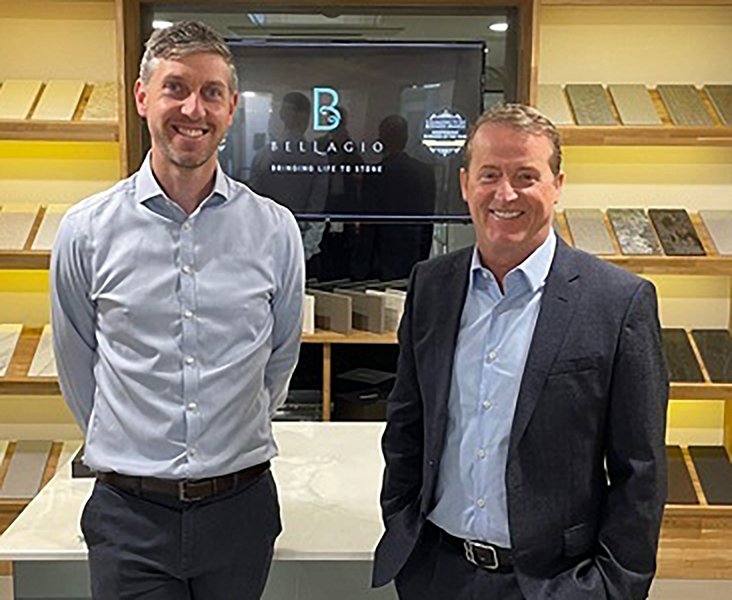David Coster, the plain speaking Director of Advanced Stone & Masonry Supplies, which sells Stain Proof and Tenax products, talks to Rob Wilkinson, MD, and Mike Boydon, Director, of Bellagio Stone in Warwick.
David: Quartz, ceramic/sintered or natural stone?
Rob: Quartz. Ceramic and sintered stone are still at an early stage. There’s still loads of issues with all of them – quality, breakages, glues, everything. Natural stone? We do a lot with the building industry and they want consistency in product. You can’t count on that with natural stone. I would have quartz in my own house. It’s difficult to damage… not impossible, but difficult.
David: Straight off the CNC or hand finished?
Rob: Straight off the edge polisher but we touch it up by hand. Most of the straight pieces will be calibrated and finished but big curves will be hand finished. I think you have got to have some hand finishing because no matter what you do you never get a perfect finish off the CNC or the edge polisher.
David: Physical templates or digital?
Rob: We’re about 40% digital at the moment. We want to get that up to about 90%. You’re never going to get away from Correx completely but digital is so much easier. It’s easier in the factory as well. The template can go straight to the drawing room, they can correct it all and file it straight out to each machine as needed. We use contractors for templating and fitting but we’re in the process of employing a percentage of our own templaters and fitters. They will all be trained on digital templaters.
David: Customers: love them or hate them?
Rob: I love them. The business wouldn’t be here without them.
David: What is the business investing in?
Rob: Our best investment has been the Optima saw from Breton because it has given us the capability of doing big projects. Our next investment is a Breton CombiCut, combining waterjet and disc cutting. After that some lifting equipment to end manual handling. We have a bit of that in factory already but we need more.
David. Do you have a carbon reduction plan for Net Zero?
Mike: Yes, we do. Everything has to be done more efficiently. It’s obviously a big topic at the moment, although it’s not that prevalent in this industry. We are probably too small to add much to the issue at the moment, but give us time. In five years it will probably be something further up the agenda.
Rob: We are members of the Worktop Fabricators Federation (WFF) and there’s a correlation between that and having to be seen to be thinking in the right way. There’s a moral obligation as a business to be seen to be doing things in the right way. That surely has to be part of the whole WFF principal. If you’re part of the WFF you have to be part of that whole wider discussion.
David: Ethical sourcing (modern slavery): how do you address this?
Rob: The suppliers we deal with are the likes of Cosentino, Beltrami, Brachot, so you would expect them to have an ethical policy. I don’t think we are big enough to have any impact. As a company we make sure the minimum wage is paid to starters and there’s a progression for them to earn a better wage.
David: Have you felt any impact of Brexit?
Rob: Yes. There’s supply issues on a lot of products and that was always going to be the main issue with Brexit. We have noticed it a lot on materials – certain colours, glue, silicone… the price of everything is going up. I think it’s a temporary thing but the prices will not drop back again.
David: Maybe the Covid pandemic is part of the same problem?
Rob. I think the world is going to be a completely different place now. There will be procedures you have to go through and I don’t think they will be gone for three or four years yet. As a business we have procedures in place to protect our employees and our customers and because of that we have carried on working, but I don’t know how other businesses are doing. People not coming into our showroom didn’t really affect us because we don’t open up to the general public. Going forward we will be opening to the public so that’s another hurdle we have to overcome.
David: Do you think the future will be better, worse or the same?
Rob: Always better. Always better.

